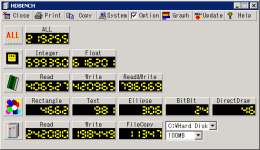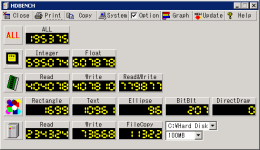I have the first benchmarks (from our Testserver).
1. On the host with
phoronix-test-suite benchmark build-linux-kernel
Debian:
Timed Linux Kernel Compilation 2.6.25:
pts/build-linux-kernel-1.2.0
Test 1 of 1
Expected Trial Run Count: 3
Running Pre-Test Script @ 11:09:40
Started Run 1 @ 11:09:59
Running Interim-Test Script @ 11:34:05
Started Run 2 @ 11:34:11
Running Interim-Test Script @ 11:58:09
Started Run 3 @ 11:58:20 [Std. Dev: 0.17%]
Running Post-Test Script @ 12:22:19
Test Results:
1442.85702205
1438.42548609
1438.95309687
Average: 1440.08 Seconds
RedHat:
Timed Linux Kernel Compilation 2.6.25:
pts/build-linux-kernel-1.2.0
Test 1 of 1
Estimated Time Remaining: 1 Hour, 13 Minutes
Expected Trial Run Count: 3
Running Pre-Test Script @ 12:28:31
Started Run 1 @ 12:28:50
Running Interim-Test Script @ 12:50:11
Started Run 2 @ 12:50:19
Running Interim-Test Script @ 13:11:33
Started Run 3 @ 13:11:39 [Std. Dev: 0.10%]
Running Post-Test Script @ 13:32:55
Test Results:
1277.09111595
1274.508708
1275.76174593
Average: 1275.79 Seconds
2. In a XP - VM with SiSoft Sandra
No change, except HD is slightly faster with RH.
I will do some test inside Windows 2008 R2 as soon as possible.
The RH-Kernel seems to perform good.
Testserver:
Hardware:
Processor: Intel Xeon 3050 @ 2.13GHz (2 Cores), Motherboard: Intel S3000AHV, Chipset: Intel E7230/3000/3010 + ICH7, Memory: 4 x 2048 MB DDR2-533MHz, Disk: 500GB 9650SE-2LP DISK, Graphics: ATI ES1000, Network: Intel 82573E Gigabit
Software:
OS: Linux, Kernel: 2.6.32-6-pve (x86_64), Display Driver: ati, Compiler: GCC 4.3.2, File-System: ext3
pve-manager: 1.9-24 (pve-manager/1.9/6542)
running kernel: 2.6.32-6-pve
proxmox-ve-2.6.32: 1.9-46
pve-kernel-2.6.32-4-pve: 2.6.32-33
pve-kernel-2.6.32-6-pve: 2.6.32-46
qemu-server: 1.1-32
pve-firmware: 1.0-14
libpve-storage-perl: 1.0-19
vncterm: 0.9-2
vzctl: 3.0.29-1pve1
vzdump: 1.2-16
vzprocps: 2.0.11-2
vzquota: 3.0.11-1
pve-qemu-kvm: 0.15.0-1
ksm-control-daemon: 1.0-6
name: XPpro
ide2: none,media=cdrom
sockets: 1
vlan0: e1000=E6:85:FD:9C:14:83
ide0: local:101/vm-101-disk-1.qcow2
ostype: wxp
memory: 2048
onboot: 0
description:
boot: cad
freeze: 0
cpuunits: 10000
acpi: 1
kvm: 1
bootdisk: ide0
cores: 1



